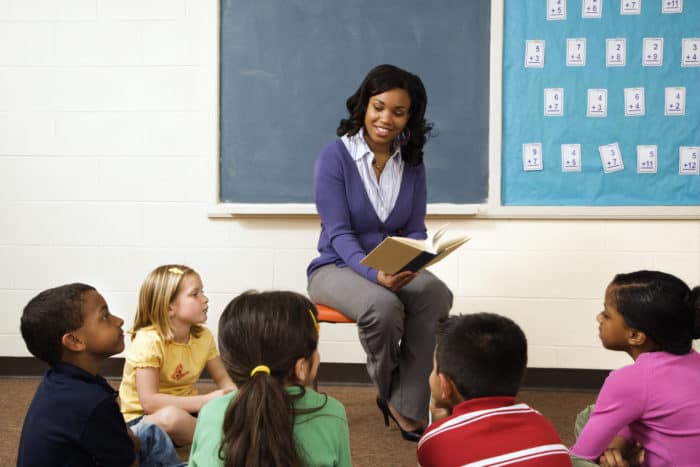How to Have a Great School Year
This post contains affiliate links. If you click & make a purchase, I receive a commission! Thanks! Read my full disclosure policy. As an Amazon Associate, I earn from qualifying purchases.
It doesn’t seem to matter if your child is in preK or a senior in college – all parents want their kids to have a good year in school. But how to have a great school year can sometimes seem like a mystery or an impossible dream.
There’s no doubt that such a goal is challenging. But as a retired teacher, a mom, and now a grandma, I’ve learned a few things that might help you to help your kids. Below are 7 suggestions for how to have a great school year. These might not all be popular, or easy to implement. But they truly can make a world of difference in your child’s school year – and his or her life!

These ideas apply most easily to elementary school kids – but most can be adapted to fit any age or stage.
Tip #1: Read Daily
Make your children read every day, even if nothing else gets done. Daily reading is the single best indicator of success in school and later, in life. This habit is more important than natural ability, test-taking strategies, private tutors, or the school your child attends. It is truly that important.
Reading at home, both with parents at younger grades and independently at higher grades, is linked to several markers of achievement: higher grades, larger vocabularies, higher reading levels, having greater self-confidence, or attending college. Daily reading is a habit you should insist on from birth until your kids move out. But if they’re in third grade, eighth grade, or even twelfth grade – it’s never too late to start building good habits.

If the idea of spending hundreds of dollars on books gives you a headache, just remember: your local public library is your best friend! And the children’s librarian is a gold mine! Get into the habit of visiting the library once a week and setting aside 20 minutes every day for reading – and then see how your child blossoms. It’ll look like a miracle.

Tip #2: Power Down
Unplug from all media at least 30 minutes prior to bedtime – an hour is even better. Media – whether tablets, phones, TV, computers, or video games – keeps the brain in an alert state, making falling asleep and getting sound sleep harder.
You may have to discipline yourself to put your own phone away for a while, but it’s worth it. When your children are grown and gone, you won’t remember who posted what, what team won the September 3rd game this year, or what the TV show was that you couldn’t pull yourself away from. But your children will remember you read to them and prayed with them every night at bedtime.
Tip #3: Bedtime Matters
While we’re on the subject of bedtime – have one and enforce it. When I was teaching, I had second graders tell me they were up past midnight! I’ve also known middle schoolers – and lots of high schoolers – who were up to the wee hours regularly.
With irregular, or even regular but late, bedtimes, your children will never be able to function as well as they should in school You are only hurting your own children if you don’t have and enforce a bedtime. Children and teens need a lot of sleep – learning is hard work.
Remember also that having a bedtime routine will help them to wind down from the day and fall asleep easier and faster. Start by unplugging (tip #2), then include some reading, some prayer, some talking and cuddling, plus brushing teeth and washing faces – and you’ve got an excellent sleep-encouraging bedtime routine.
Tip #4: Take Charge of Media

Control your child’s media exposure at times other than just before bed as well. Taking charge of what your child sees and hears – as well as when and where – is part of your job as a parent. If your child never says, “But all the other kids get to ____” you’re probably doing something wrong!
Technology is here to stay and it can be a useful tool. But only a tool – not an addition or a substitute for real life and real relationships. Just like tip #2, you may find the biggest hurdle you face here is yourself. Be the grownup and bless your family with healthy media boundaries. And for more ideas and insight, read this.
Tips #5: Let Your Kids PLAY!
Free, unstructured, undirected play seems to be a lost art. Or more aptly, a lost treasure. Because that’s the type of playing that builds creativity, imagination, problem-solving skills, critical thinking skills, and self-awareness.
Don’t fool yourself into thinking that they get plenty of playtime at recess. Some schools don’t even have recess anymore. And the most time they’ll ever get is probably 20 minutes. It takes about 30 minutes of unstructured play before creative thinking kicks in! Recess is great – and your kids should be getting it. But it isn’t nearly enough.
If you think finding the time for simply playing will be difficult, drag out the calendar and schedule it – just like you would for soccer practice, karate, or piano lessons. If your life or your child’s activities don’t allow for free play on the calendar for at least 5 days out of 7, then something needs to go. But not playtime! Ditch the baseball or ballet, the football or flute lessons. Clear their calendar – and yours – so they can just play. After all, they’re only kids for a little while.

Tips #6: Outdoor Play BEFORE Homework
I know it’s tempting to tell your kids they have to do homework first. But think this through. Your child has just spent 7 or 8 hours sitting down, following directions, being told what to do, and even being restricted from going to the bathroom. Wouldn’t that schedule make you a little antsy?
And now you want them to…sit down again? Work on school work…again?? I’d be tempted to have a meltdown also.
Trust me, if you let them play outside before doing homework, everyone wins. They’ll have time to decompress or de-stress. They’ll relax. Their blood will flow to their brains again. And when homework time comes, they’ll actually be able to do it without as much drama, tears, or frustration.
I understand this is a challenge to arrange. You might not get home until 6 PM. And then they need dinner, homework, baths, bedtime routine. No one said being a parent would be easy! Seriously though, however you do it, make it work. Maybe that means dinner is lighter and later – save the meat-and-potatoes or pasta dishes for the weekend and major on soups, salads, and sandwiches.
One important rule to make prioritizing outdoor play happen is this: “No TV or screens until after ____.” First, play, then dinner. Then homework. And, if there’s time, maybe a little TV or screen time. But trust me, if they don’t get screen time, they won’t die. Playing outside is very important for the healthy development of your child’s body and mind.
Tip #7: Respect Your Child’s Teacher
Finally, don’t tear down your child’s teacher – or any teacher – in front of him or her. Teachers have a hard job and if you don’t respect them neither will your child. Give the teachers in your child’s life support by treating them with the respect you expect for yourself and for your child.

I know that there are bad teachers out there – and your child might have one. In fact, he or she probably will have a bad teacher sooner or later. Or at least a teacher who’s difficult for you to like or work with. But, again, you get to be the grownup. You can actually dislike someone and still show them respect. No one likes to do that, but it is possible and used to be common.
When you show respect to your child’s teacher, you’re paving the way to a good working relationship with him or her. And since your child is with that person for hours every day, you want to have a good working relationship. The good news is that most teachers want the same thing. And most teachers truly do love teaching and want the best for your child.
Of course, if you cross paths with a teacher who is undermining your relationship with your child or trying to influence them away from your faith, all bets are off. Still be respectful, but protecting your child always wins!
I hope you and your child or children all have a great school year – and their teachers do as well!






